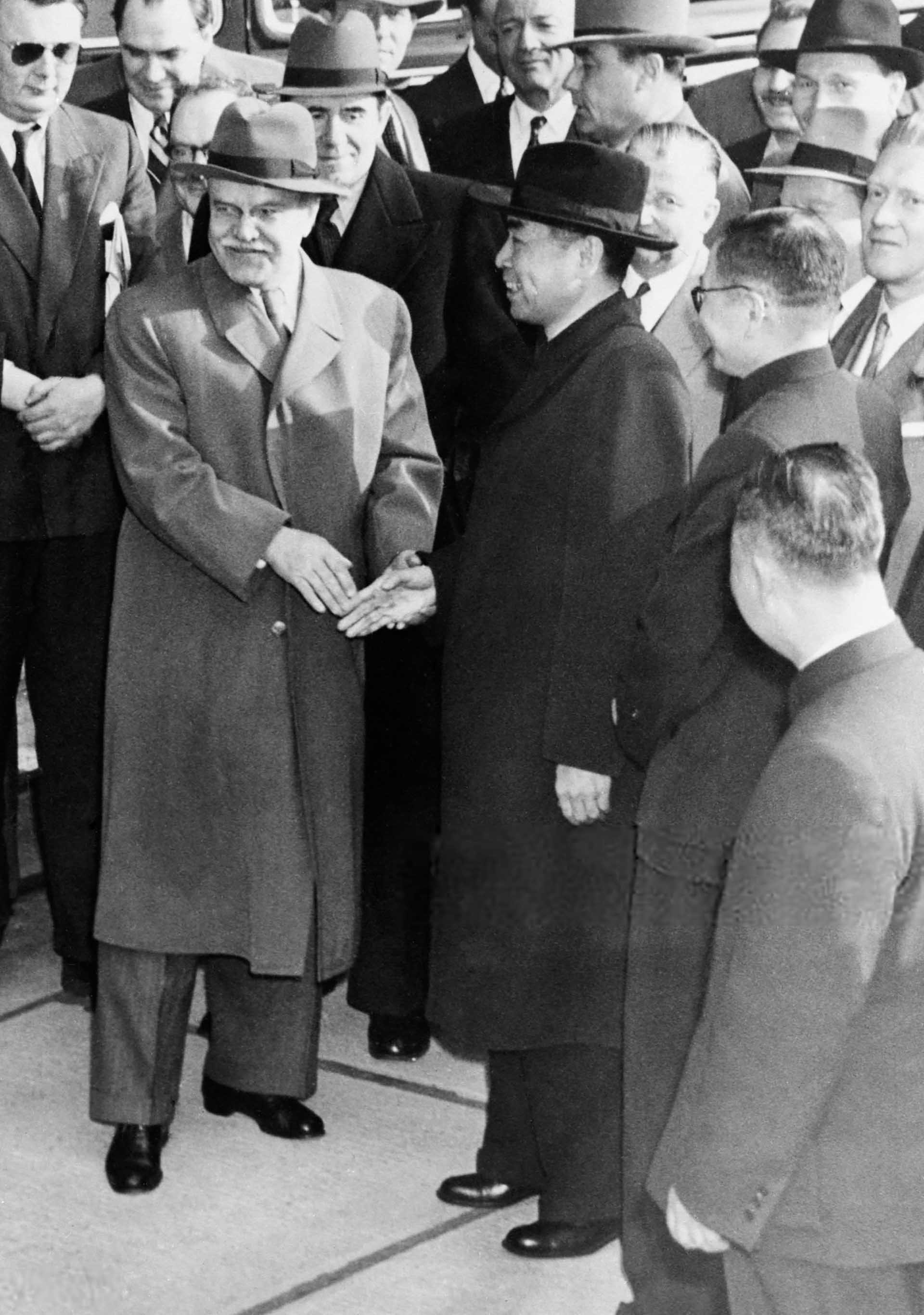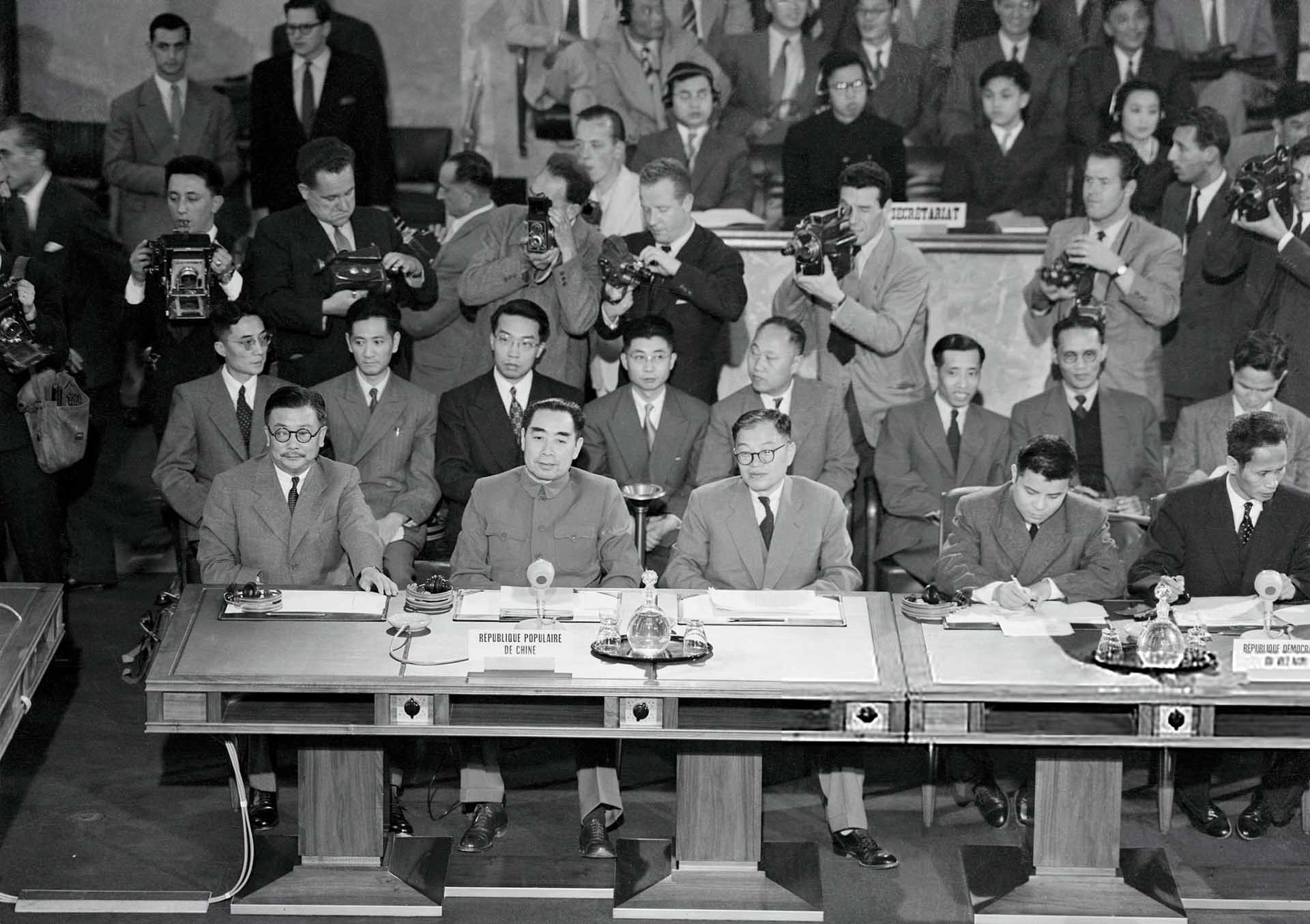
The Geneva “arena” and China’s first “big show”
Latest
 |
| Soviet Delegation Leader Vyacheslav Molotov (left) prepares to shake hands with Chinese Delegation Leader Zhou Enlai in Geneva, on April 24, 1954. (Source: Getty images) |
After the signing of the Korean Armistice Agreement on July 27, 1953, the Soviet Union and China both agreed that it was necessary to resolve the remaining conflicts in Asia. However, at the Big Four Conference in Berlin on January 25, 1954, Soviet Foreign Minister Molotov insisted that China must be present for discussions on Korea and Indochina, a demand vehemently opposed by the United States.
After extensive negotiations and persuasions, on February 18, 1954, the Berlin Conference finally agreed to allow China to partake in the Geneva Conference. Nevertheless, the United States remained steadfast, declaring, “U.S. participation in negotiations does not imply U.S. recognition of the Communist Party government of China in any way.”[1]
ACTIVE PARTICIPATION
Thus, since the establishment of the new People’s Republic of China, this marked the first time China participated in a major international conference, drawing global attention to discuss significant regional issues. To prepare for this crucial diplomatic endeavor, on March 2, 1954, at a meeting of the Central Committee of the Communist Party of China, Zhou Enlai presented a Report on the preliminary evaluation of the Geneva Conference and the preparation works. Zhou Enlai outlined the direction: “Active participation in the Geneva Conference. Simultaneously, intensification of international diplomatic activities, breakage of the US blockade and embargo, and the policies on imperialist mobilization for war in order to strengthen the reduction of tension in the international conjuncture.[2]
Right after the meeting, the Central Committee of the Communist Party of China sent a telegram to the Vietnamese Workers’ Party, stating that both China and the Soviet Union believed that the Geneva Conference would benefit Vietnam. They hoped that the Vietnamese Worker’s Party would organize a delegation of the three Indochinese countries to participate in the conference, and prepare with concerted efforts on documents and negotiation plans. In the telegram, he suggested that: “If there’s a desire for the cessation of hostilities, it is crucial to establish a relatively fixed demarcation line, which can ensure a relatively complete area (...). Determining where the demarcation line should be, and at what latitude, needs to consider two issues: First, it must benefit Vietnam. Second, whether the enemy can accept it or not. The further south the demarcation line goes, the better. The 16th parallel can be considered as a reference.”[3]
On March 3, 1954, Xinhua News Agency announced that the Chinese government would participate in the Geneva Conference on the Korean Peninsula and Indochina. On the same day, Zhou Enlai ordered the General Staff of the People’s Liberation Army to direct Wei Guoqing and Mei Jiasheng (who were presented in Dien Bien Phu) to engage in discussions to help Vietnam in battle, as well as in negotiation coordination in Geneva.
| The Geneva Agreements of Indochina reflect the struggle of the Vietnamese people in particular and the people of the three Indochinese countries in general on the protection of their independence and sovereignty. However, the ‘Geneva Agreement is an incomplete peace solution’ due to the international context at that time and the divergent goals of the participating countries, including China. The interests of the parties are evident in their negotiating positions. The Vietnamese Revolution on the international chessboard – History and issues, National Political Publishing House, pg 52. |
During the preparations for the Geneva Conference, China maintained close communication with the Soviet Union. In April 1954 alone, there were three discussions between Zhou Enlai and Soviet leaders. Zhou Enlai consistently emphasized: “This is the first time China has partaken in a major international conference that the world is closely watching. Thus, China lacks the necessary knowledge and experience to struggle on an international level. That is why China and the Soviet Union need to maintain close contact, regularly exchange opinions and intelligence, and coordinate actions”.[4]
Throughout March and the first half of April 1954, Zhou Enlai personally reviewed, revised, and approved documents related to the Geneva Conference, for example: “Pleminary opinions on the peace plan of a unified Korea”, “Pleminary opinions on the peaceful settlement of Indochina issues”. On April 20, 1954, a delegation of over 200 people[5], consisting of outstanding talents from China’s diplomatic sector, departed for Geneva.
Zhou Enlai was proud when talking about his delegation: “This is like a big opera of Mei Lanfang[6], each person is a perfect part, forming a strong unified bloc”[7]. The delegation came to the negotiation with a spirit of: “China is a major power who arrives in Geneva to participate in an official international conference. We stand on the international stage performing a drama. Therefore, in literary drama, there must be martial arts drama, but in short, it is formal drama and martial arts drama[8].
The meticulous, comprehensive, and cautious preparation process for the appearance on the “Geneva Arena” not only demonstrated China’s important and profound objectives there but also reflected the high determination to achieve these objectives.
On April 26, 1954, the Geneva Conference officially convened coinciding with the People’s Army of Vietnam’s victory at Dien Bien Phu. Dien Bien Phu was the focus of the world. At 5:20 A.M on July 21, 1954, the Geneva Conference on Indochina announced its closing. Along with the signing of the Geneva Agreements, the Sino-US relations cautiously took steps forward. Both sides organized liaison officer meetings for the first and second time and maintained communication channels in Geneva. This was a suitable stepping stone for subsequent ambassador-level negotiations between China and the United States.[9]
 |
| Delegations of China and the Democratic Republic of Vietnam at a session within the framework of the Geneva Conference in 1954. (Source: Getty images) |
LARGE DELEGATION
The Geneva Conference brought significant benefits to China. Politically, the conference demonstrated that China played a crucial role in resolving urgent international issues. Economically, two years after the conference, trade volume between China and European countries notably increased, and nearly doubled. If the total volume in 1954 was 173.4 million USD, by 1955 it reached 226.2 million USD, and by 1956 it was 326 million USD”[10]. In terms of foreign affairs, “the signing of the Geneva Agreements marked the expansion of China’s influence in international affairs and the enhancement of China’s international status”[11]. At the same time, “the peaceful resolution of the Indochina issue disrupted the implementation of the U.S. strategy aimed at threatening China from three fronts: South Korea, Taiwan, and Indochina, ensuring security for China’s southern border. This allowed China to focus its manpower and resources on economic development”[12].
Accompanying the Head of the Chinese Delegation Zhou Enlai, were three Deputy Ministers of Foreign Affairs (MOFA: Zhang Wentian, Wang Jiaxiang, and Li Kenong. In addition, there were also Deputy Minister of Foreign Trade, Secretary General of the MOFA, Political Secretary of MOFA, MOFA Advisor, Director of Asia Department, Director of the West Asia and Africa Department, former acting Director of the Asia Department, Director of the Information Department, Director of the US and Australia Department, Director of the MOFA Protocol Department…
According to the assessment of the Chinese Ministry of Foreign Affairs, the Chinese Delegation at the Geneva Conference played a significant role in delimiting the regrouping zones for the fighting parties in Vietnam.
“On 21 July, the Geneva Conference adopted a Final Declaration which brought about an end to the war in Indochina, termination of the long years of colonial wars carried out by France in this region, and affirmed the national rights of the three Indochinese states. This is an important milestone in the process of the struggles for independence by the people of the three Indo-Chinese states. At the same time, once again for the world as a whole, the Geneva Conference brought into sight the Chinese people’s positive role in their unremitting efforts for the security of their motherland, for the cause of world peace and human progress and for a negotiated settlement of international disputes”.
[1] . Tạ Ích Hiển (chủ biên): Lịch sử ngoại giao Trung Quốc đương đại (1949-2001), tr.55.
[2] . Preliminary Opinions on the Assessment of and Preparation for the Geneva Conference,’ Prepared by the PRC Ministry of Foreign Affairs (drafted by PRC Premier and Foreign Minister Zhou Enlai) [Excerpt]” March 02, 1954, History and Public Policy Program Digital Archive, PRC FMA 206-Y0054, CWIHP.
[3] . Qian Jiang: Zhou Enlai and the Geneva Conference, Ibid, p.26.
[4] . Qian Jiang: Zhou Enlai and the Geneva Conference, Ibid, p.36.
[5] Đoàn đại biểu được chia làm sáu tổ: tổ về vấn đề Triều Tiên, tổ về vấn đề Việt Nam, vấn đề tổng hợp, tổ tin tức tuyên truyền, tổ thư ký và tổ giao tiếp hành chính, trong đó có thêm năm phiên dịch tiếng Nga, bốn phiên dịch tiếng Anh, bốn phiên dịch tiếng Pháp, ngoài ra còn có đầu bếp, lái xe, tổng cộng là 185 người, cộng thêm 29 nhà báo.
[6] Nghệ sĩ kinh kịch lừng danh Trung Quốc.
[7] . Qian Jiang: Zhou Enlai and the Geneva Conference, Ibid, p.42.
[8] . Qian Jiang: Zhou Enlai and the Geneva Conference, Ibid, p.50.
[9] . Zhai Qiang: China and the Geneva Conference of1954, The China Quarterly, No. 129 (Mar, 1992), p.122.
[10] Francois Joyaux: Trung Quốc và việc giải quyết cuộc chiến tranh Đông Dương lần thứ nhất, Sđd, tr.255.
[11] . Bộ Ngoại giao: Hội nghị Geneva và quan hệ quốc tế sau Chiến tranh lạnh - lấy Trung Quốc, Việt Nam và Trung Quốc làm ví dụ, Tlđd, tr.4.
[12] Bộ Ngoại giao: Hội nghị Geneva và quan hệ quốc tế sau Chiến tranh lạnh - lấy Trung Quốc, Việt Nam và Trung Quốc làm ví dụ, Tlđd, tr.3.













